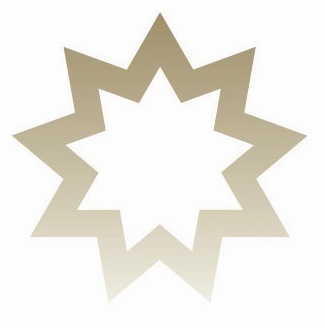Who is Baha'u'llah?
Who is Baha’u’llah?
| Over 150 years ago, Bahá’u’lláh declared that the Day promised by all religions of the past had arrived. His mission was to unite the hearts of humanity, to bring peace and justice to the world, and to guide humanity through its development in a new age.
Bahá’u’lláh (“Glory of God” in Arabic) was born to a noble family in Tihrán, the capital of Persia, in 1817. He was well-known for his insightfulness and depth of understanding as a young child, despite receiving little formal education. When He grew older, He declined a position offered in the King’s court, choosing instead to spend His time tending to the sick, poor, and oppressed. He became known as the “Father of the Poor” for His generosity and assistance to those in need. In 1844, a Youth entitled the Báb (“Gate” in Arabic) declared in Persia that “He whom God shall make manifest” would soon appear, one who would usher in a new age for humanity, and that all should prepare themselves for His coming. For declaring their belief in His message, thousands upon thousands of people across Persia were imprisoned or killed, including Bahá’u’lláh, who was placed under 110-pound chains in a dungeon below Tihran. He was soon exiled to Baghdad with His family, suffered to travel by foot through the snowy mountains in the depth of winter. However, He never ceased to shower His love upon those surrounding Him. Everywhere He went, people of all social, racial and political backgrounds began to seek His insight, compassion and guidance. It was outside Baghdad, in what He referred to as the Garden of Ridvan (“Paradise”) that Bahá’u’lláh declared to those around Him that He was the Promised One of all ages, for whose advent people across the world had been waiting. Despite being tortured, imprisoned and exiled from city to city across the Middle East, He shared His message of love, unity and peace throughout the world. In books, tablets and letters revealed to followers, inquirers, and the kings and rulers of His time, He revealed the principles and teachings of the Baha’i Faith, provided laws and ordinances to guide humanity through this new age, and prescribed a system by which humanity could put aside its differences and live in unity. In His final years, He was banished to the prison-city of Akka in what was then Palestine. Although a prisoner, He established His ascendancy through His love, the devotion and transformation in the lives of His followers, and the light that has inspired millions across the world to give all they have to serve mankind. In the spring of 1890, Professor E.G. Browne of Cambridge University traveled to Akka to see Bahá’u’lláh. He recorded the experience and their conversation. “Thou hast come to see a prisoner and an exile… We desire but the good of the world and the happiness of the nations; yet they deem us a stirrer up of strife and sedition worthy of bondage and banishment… that all nations should become one in faith and all men as brothers; that the bonds of affection and unity between the sons of men should be strengthened; that diversity of religion should cease and differences of race be annulled – what harm is there in this?… Yet so it shall be; these fruitless strifes, these ruinous wars shall pass away, and the ‘Most Great Peace’ shall come… Do not you in Europe need this also? Is not this that which Christ foretold?… Yet do we see your kings and rulers lavishing their treasures more freely on means for the destruction of the human race than on that which would conduce to the happiness of mankind… These strifes and this bloodshed and discord must cease, and all men be as one kindred and one family… Let not a man glory in this, that he loves his country; let him rather glory in this, that he loves his kind.” |
“Thou hast come to see a prisoner and an exile… We desire but the good of the world and the happiness of the nations; yet they deem us a stirrer up of strife and sedition worthy of bondage and banishment… that all nations should become one in faith and all men as brothers; that the bonds of affection and unity between the sons of men should be strengthened; that diversity of religion should cease and differences of race be annulled – what harm is there in this?… Yet so it shall be; these fruitless strifes, these ruinous wars shall pass away, and the ‘Most Great Peace’ shall come… Do not you in Europe need this also? Is not this that which Christ foretold?… Yet do we see your kings and rulers lavishing their treasures more freely on means for the destruction of the human race than on that which would conduce to the happiness of mankind… These strifes and this bloodshed and discord must cease, and all men be as one kindred and one family… Let not a man glory in this, that he loves his country; let him rather glory in this, that he loves his kind.”
To learn more about the life of Bahá’u’lláh, you can visit: The Life of Baha’u’llah: A Photographic Narrative
